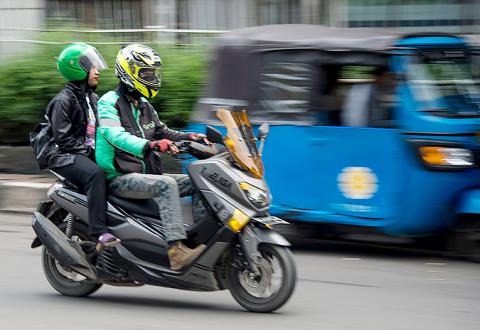Auto-rickshaw driver Zainuddin used to make decent money navigating Jakarta’s congested roads and narrow alleyways.
However, now US-based Uber Technologies Inc, Google-backed PT Go-Jek Indonesia and Singapore’s Grab are locked in a race for ride-hailing app supremacy in Southeast Asia’s biggest economy, denting the fortunes of traditional three-wheeled bajaj taxis that once ruled Indonesia’s roads.
“Our income has fallen to between 70 and 80 percent since ride-hailing apps came on the scene,” said Zainuddin, who like many Indonesians goes by one name.

Photo: AFP
There were about 14,000 bajaj on Indonesia’s roads by 2015, according to the latest official figures.
By contrast, Go-Jek alone claims 900,000 drivers and about 15 million weekly active users. It launched in 2010.
Singapore’s sovereign wealth fund Temasek Holdings Pte and Google have announced investments in Go-Jek, which has been valued at as much as US$5 billion although it is little known outside Asia.
Southeast Asia’s ride-hailing market more than doubled in two years to about US$5 billion last year and it is expected to reach US$20 billion by 2025, with Indonesia set to account for about 40 percent of it, according to research done by Google and Temasek.
The ride-hailing trio offer fixed-price rides that take haggling out of the equation, a welcome change for former bajaj customer Tetty Iskandar.
“I haven’t taken a bajaj in years,” said the 35-year-old housewife, who used to ride the three-wheelers to go grocery shopping. “You had to bargain with the drivers to get cheap fares and you would already have done a lot of bargaining in the market. Sometimes I felt so tired and just wanted to get home.”
The vast archipelago of about 260 million people has a relatively low per capita car ownership rate and vehicle owners often choose to leave their ride at home, opting instead for a fixed-price motorcycle that can zip through Jakarta’s epic traffic congestion — at bargain-basement prices.
That is threatening bajaj — not to mention regular cabs and ubiquitous motorbike taxis known as ojek — which arrived in Indonesia during the 1970s. The motorized rickshaw quickly made inroads under its namesake company, which hailed from India.
The name bajaj is now inked into Jakarta’s lexicon after supplanting traditional bicycle taxis. A distinctive blue model of the vehicle is still a common sight and while pollution-spewing older models are outlawed, some still ply the narrow alleyways of Indonesia’s sprawling capital.
Government efforts to reduce traffic snarls by reintroducing bicycle taxis could further chip away at the market share of bajaj, which cannot operate on highways and certain busy streets.
Still, bajaj backers say the little tuk-tuk is safer than a motorcycle, which has higher injury and fatality rates.
“They are still a very useful means of transport when you have to go through small alleys and roads in Jakarta,” said Danang Parikesit, president of the Indonesia Transportation Society think tank.
Despite the threat of technology, some insist bajaj have a future, especially among customers who do not want to get soaked on the back of a motorbike, or while waiting for a hired car during the months-long rainy season.
“Customers don’t like to get wet,” tuk-tuk driver Zainuddin said. “It’s not good for people when the rain comes, but bajaj drivers will be happy.”

Intel Corp chief executive officer Lip-Bu Tan (陳立武) is expected to meet with Taiwanese suppliers next month in conjunction with the opening of the Computex Taipei trade show, supply chain sources said on Monday. The visit, the first for Tan to Taiwan since assuming his new post last month, would be aimed at enhancing Intel’s ties with suppliers in Taiwan as he attempts to help turn around the struggling US chipmaker, the sources said. Tan is to hold a banquet to celebrate Intel’s 40-year presence in Taiwan before Computex opens on May 20 and invite dozens of Taiwanese suppliers to exchange views

Application-specific integrated circuit designer Faraday Technology Corp (智原) yesterday said that although revenue this quarter would decline 30 percent from last quarter, it retained its full-year forecast of revenue growth of 100 percent. The company attributed the quarterly drop to a slowdown in customers’ production of chips using Faraday’s advanced packaging technology. The company is still confident about its revenue growth this year, given its strong “design-win” — or the projects it won to help customers design their chips, Faraday president Steve Wang (王國雍) told an online earnings conference. “The design-win this year is better than we expected. We believe we will win

Chizuko Kimura has become the first female sushi chef in the world to win a Michelin star, fulfilling a promise she made to her dying husband to continue his legacy. The 54-year-old Japanese chef regained the Michelin star her late husband, Shunei Kimura, won three years ago for their Sushi Shunei restaurant in Paris. For Shunei Kimura, the star was a dream come true. However, the joy was short-lived. He died from cancer just three months later in June 2022. He was 65. The following year, the restaurant in the heart of Montmartre lost its star rating. Chizuko Kimura insisted that the new star is still down

While China’s leaders use their economic and political might to fight US President Donald Trump’s trade war “to the end,” its army of social media soldiers are embarking on a more humorous campaign online. Trump’s tariff blitz has seen Washington and Beijing impose eye-watering duties on imports from the other, fanning a standoff between the economic superpowers that has sparked global recession fears and sent markets into a tailspin. Trump says his policy is a response to years of being “ripped off” by other countries and aims to bring manufacturing to the US, forcing companies to employ US workers. However, China’s online warriors